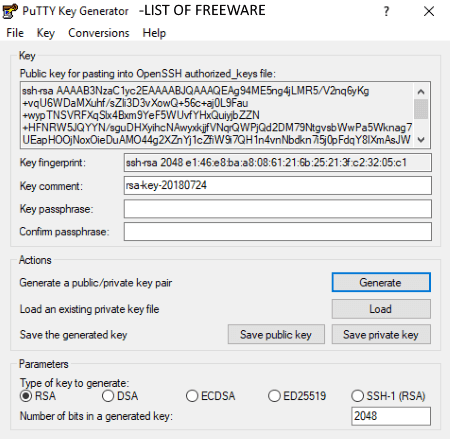- Ecc Key Pair Generation Online Cz
- Ecc Key Pair Generation Online Subtitrat
- Ecc Key Pair Generation Online Sa Prevodom
- Ecc Key Pair Generation Online Shopping
ECDSA with secp256k1 in Java: generate ECC keys, sign, verify - ECDSA-secp256k1-example.java. Generate a private ECDSA key: $ openssl ecparam -name prime256v1 -genkey -noout -out private.ec.key Convert and encrypt the private key with a pass phrase: $ openssl pkcs8 -topk8 -in private.ec.key -out private.pem You can now securely delete private.ec.key as long as you remember the pass phrase. Generate public ECDSA key. The Generate ECC Key Pair (OPM, QC3GENECC; ILE, Qc3GenECCKeyPair) API generates a random ECC key pair given a set of domain parameters to be used with elliptic curve cryptographic algorithms such as ECDSA. Information on cryptographic standards can be found in Create Algorithm Context (OPM, QC3CRTAX; ILE, Qc3CreateAlgorithmContext) API. Now my problem is turned to be how to make a SM2 arg. SM2 is a kind of ECC. It is a chinese official standard. Thank you for the same, but i have alread solved the question.Yesteday I meant that the NSS is enable for ecc with an NSSENABLEECC flag, but I didn't find an ECC params to fill the PK11GenerateKeyPair argv. Here is an explanation of how to create your new ECC keys for GnuPG. GnuPG 2.1.x supports ECC (Elliptic Curve Cryptography). ECC is generic term and security of ECC depends on the curve used. Unfortunately, no one wants to use standardized curve of NIST. Since GnuPG 2.1.0, we can use Ed25519 for digital signing.


Pretty Good Privacy (PGP) is a data encryption and decryption computer program that provides cryptographic privacy and authentication for data communication. PGP is often used for signing, encrypting, and decrypting texts, e-mails, files, directories, and whole disk partitions and to increase the security of e-mail communications. It was created by Phil Zimmermann in 1991. PGP and similar software follow the OpenPGP standard (RFC 4880) for encrypting and decrypting data. Source: Wikipedia
This site only provides a simple and easy-to-use tool for people to generate PGP keys with. Today, the common methods for generating keys still involve going to a command prompt of a Linux/Unix machine and using the GPG utility, or installing a PGP compatible application on your desktop. I wanted to provide an easier way to generate keys. None of this would be possible without the awesome Open Source software I'm utilizing. I'm using KeyBase's awesome JavaScript implementation of PGP (kbpgp). For file saving capabilities I am utilizing Eli Grey's wonderful FileSaver.js interface.
This site is Open Source and the source code is available on GitHub under MIT license. This project has been updated with the forked versions from Ramuta and TheChiefMeat.
| importorg.bouncycastle.util.encoders.Hex; |
| importorg.web3j.crypto.*; |
| importjava.math.BigInteger; |
| publicclassECCExample { |
| publicstaticStringcompressPubKey(BigIntegerpubKey) { |
| String pubKeyYPrefix = pubKey.testBit(0) ?'03':'02'; |
| String pubKeyHex = pubKey.toString(16); |
| String pubKeyX = pubKeyHex.substring(0, 64); |
| return pubKeyYPrefix + pubKeyX; |
| } |
| publicstaticvoidmain(String[] args) throwsException { |
| //BigInteger privKey = Keys.createEcKeyPair().getPrivateKey(); |
| BigInteger privKey =newBigInteger('97ddae0f3a25b92268175400149d65d6887b9cefaf28ea2c078e05cdc15a3c0a', 16); |
| BigInteger pubKey =Sign.publicKeyFromPrivate(privKey); |
| ECKeyPair keyPair =newECKeyPair(privKey, pubKey); |
| System.out.println('Private key: '+ privKey.toString(16)); |
| System.out.println('Public key: '+ pubKey.toString(16)); |
| System.out.println('Public key (compressed): '+ compressPubKey(pubKey)); |
| String msg ='Message for signing'; |
| byte[] msgHash =Hash.sha3(msg.getBytes()); |
| Sign.SignatureData signature =Sign.signMessage(msgHash, keyPair, false); |
| System.out.println('Msg: '+ msg); |
| System.out.println('Msg hash: '+Hex.toHexString(msgHash)); |
| System.out.printf('Signature: [v = %d, r = %s, s = %s]n', |
| signature.getV() -27, |
| Hex.toHexString(signature.getR()), |
| Hex.toHexString(signature.getS())); |
| System.out.println(); |
| BigInteger pubKeyRecovered =Sign.signedMessageToKey(msg.getBytes(), signature); |
| System.out.println('Recovered public key: '+ pubKeyRecovered.toString(16)); |
| boolean validSig = pubKey.equals(pubKeyRecovered); |
| System.out.println('Signature valid? '+ validSig); |
| } |
| } |
| <?xml version='1.0' encoding='UTF-8'?> |
| <projectxmlns='http://maven.apache.org/POM/4.0.0' |
| xmlns:xsi='http://www.w3.org/2001/XMLSchema-instance' |
| xsi:schemaLocation='http://maven.apache.org/POM/4.0.0 http://maven.apache.org/xsd/maven-4.0.0.xsd'> |
| <modelVersion>4.0.0</modelVersion> |
| <groupId>bc-examples</groupId> |
| <artifactId>bc-examples</artifactId> |
| <version>1.0-SNAPSHOT</version> |
| <dependencies> |
| <dependency> |
| <groupId>org.web3j</groupId> |
| <artifactId>crypto</artifactId> |
| <version>3.3.1</version> |
| </dependency> |
| </dependencies> |
| </project> |
Ecc Key Pair Generation Online Cz
commented Apr 5, 2018
commented Sep 16, 2018
Ecc Key Pair Generation Online Subtitrat
java.security package contains ECDSA classes for generating the key pair, signing and verifying signatures. |